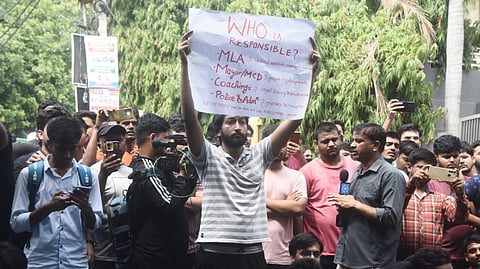Delhi coaching centre crisis: How focus on profit puts lives of students at stake
The lucrative yet perilous world of civil services coaching in Delhi is making headlines for all the wrong reasons. The recent deaths of three students in Rajendra Nagar have sparked concerns over the unregulated, rampant basement study centres that charge exorbitant fees.
Delhi has long been a magnet for civil services aspirants from across India. The city’s coaching industry has grown into a multi-crore enterprise, driven by the aspirations of thousands of young minds seeking to crack one of the country’s toughest exams. Despite the humble set-ups, often in rented premises and basements, the business of coaching classes for civil services in Delhi is thriving. However, it’s not without its challenges and criticisms.
Students flocking to Delhi’s coaching hubs like Mukherjee Nagar and Rajinder Nagar come from all corners of India. They represent a broad spectrum of educational backgrounds, from humanities and science graduates to engineers and law students. Most are in their twenties, though many older candidates also seek the coveted IAS, IPS and IFS positions. This diverse mix creates a competitive and dynamic learning environment. These young aspirants are drawn by the promise of structured guidance, expert faculty, and a concentrated environment of like-minded peers, all striving for the same goal.
Enrolling in these coaching classes is a substantial financial commitment. Comprehensive courses typically range from INR 1,00,000 to INR 1,50,000 annually. Optional subject courses and test series add further to the expense, costing between INR 30,000 to INR 50,000 and INR 10,000 to INR 30,000 respectively. Despite these high fees, demand remains robust, making the coaching business highly profitable. This highlights the immense pressure and financial burden on students and their families.
Faculty at major coaching institutes in Delhi are often the backbone of their success, commanding high fees due to their expertise. Senior faculty members can earn between INR 1,00,000 to INR 2,00,000 per month, while less experienced teachers might earn between INR 50,000 to INR 1,00,000 per month. Many are former civil servants or individuals who have cleared multiple stages of the UPSC exams, adding to the allure of top coaching institutes.
Abha Dev Habib, Associate Professor at Miranda House and Secretary of the Democratic Teachers Front, asserts that the commercialisation of education extends beyond civil services coaching to encompass all streams. "All competitive exams, including bank and government exams, have become commercialised. Values have eroded. In the past, there were waves of students from Bihar and Uttar Pradesh, but this trend has declined because parents cannot afford the costs of both graduation and competitive exams."
Despite high fees, many coaching institutes operate out of small, rented spaces, often in basements. Renting smaller spaces in central areas like Mukherjee Nagar and Rajinder Nagar is more affordable than purchasing large premises. However, these cost-saving measures often lead to cramped, uncomfortable learning environments. The focus on profitability sometimes overshadows the need for adequate and safe facilities, creating a dichotomy between financial success and student welfare.
Facilities in these crowded coaching centres vary widely but generally include regular classroom sessions in cramped rooms that can sometimes accommodate 100 or more students. Study materials are comprehensive, though often shared among a large number of students. Limited access to libraries and hostel accommodations, which can be equally cramped and uncomfortable, are also common. Despite these drawbacks, the promise of a successful civil services career keeps students motivated and focused.
The travails of students preparing for civil services exams in Delhi's coaching centres are manifold. Rahul Sharma, a final-year aspirant from Uttar Pradesh, has been living in Mukherjee Nagar for the past two years. His father, a grocer in Etawah, sold their ancestral property to fund Rahul's education. "I don’t know how long I will survive with my meagre resources," says Rahul, highlighting the financial burden and mental stress.
Neha Verma, a student from Rajendra Nagar, juggles her studies with part-time work to manage expenses. This balancing act impacts her preparation and adds to her stress levels. Amit Kumar, an aspirant from a rural area, has faced substantial cultural and lifestyle adjustments since moving to Delhi. The transition from a quiet, close-knit community to the bustling, often isolating life in the city has been challenging.
The narrow lanes, overhanging wires, and makeshift accommodations in these coaching hubs pose significant safety risks. The recent tragic drowning of three students in a coaching centre basement has highlighted these dangers, underscoring the urgent need for better regulation and infrastructure improvements.
Despite the apparent success, the coaching industry faces several challenges. The pressure and stress of preparation, coupled with high competition, can lead to significant mental health issues among students.
The value provided by these coaching classes largely depends on the institute. Reputed centres with a track record of successful candidates often justify their fees through quality education and robust support systems. However, students need to conduct thorough research before enrolling, ensuring that their investment will indeed translate into the desired results.
The civil services coaching industry in Delhi is a risky venture. While the aspiration to join the civil services drives thousands to these centres, the reality is often a stark contrast to the promises made by the glossy brochures. As the industry continues to grow, there is an urgent need for better infrastructure, safety measures, and more stringent regulations to ensure that the pursuit of dreams does not turn into a precarious journey.

